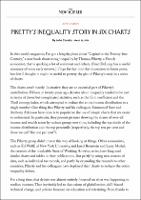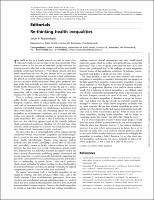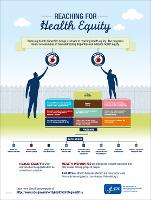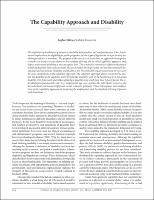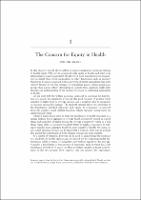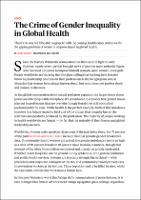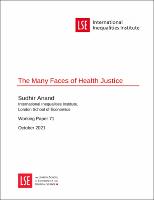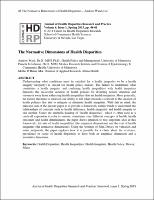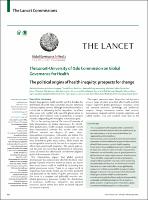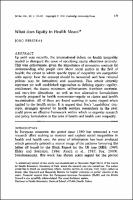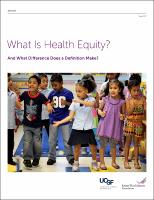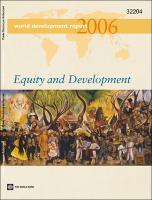Browsing 1.01.01 Inequality vs Inequity by Title
Now showing items 16-29 of 29
-
Piketty’s Inequality Story in Six Charts
(The New Yorker, 2014) -
Re-thinking health inequalities
(Oxford University Press on behalf of The European Journal of Public Health, 2020-06-19) -
Reaching for Health Equity
(US CDC, 2016) -
Regional strategy on health system strengthening and primary health care
(Manila : WHO Regional Office for the Western Pacific, 2010) -
RESPONSIBILITY FOR HEALTH AND HEALTH CARE
(Oxford University Press 2005) -
The Capability Approach and Disability
(JOURNAL OF DISABILITY POLICY STUDIES)
The definition of disability is of interest to disability policymakers and analysts because it has fundamental implications for eligibility for public programs, for the scope of legislation, and for the way disability prevalence is measured. The purpose of this article is to assess how an approach developed in economics to analyze issues related to the standard of living, the so-called capability approach, may help us understand disability at the conceptual level. The article first summarizes different theoretical models of disability (the ... -
The Concern for Health Equity
(Oxford University Press 2004, 2004) -
The Crime of Gender Inequality in Global Health
(Voice-Foreign Policy) -
The Many Faces of Health Justice
(The London School of Economics and Political Science, October 20)
This paper develops the idea of health justice as a plural conception. It draws on the literature on justice from philosophy and economics, and investigates its application and reach in the space of health. Several distinctions are invoked in identifying and contrasting different facets of health justice and injustice. These include active versus passive injustice; process fairness versus substantive justice; comparative versus noncomparative justice; compensatory and distributive justice. Within distributive justice, the health implications of ... -
The Normative Dimensions of Health Disparities
(Journal of Health Disparities Research and Practice, 2013)
Understanding what conditions must be satisfied for a health inequality to be a health inequity (disparity) is crucial for health policy makers. The failure to understand what constitutes a health inequity, and confusing health inequalities with health inequities threatens the successful creation of health policies by diverting needed attention and resources away from addressing health inequalities that are health inequities. More generally, the failure threatens to undercut our ability to tell what research is relevant to the creation of health ... -
The political origins of health inequity: prospects for change
(The Lancet - University of Oslo Commission on Global Governance for Health, 2014)
Despite large gains in health over the past few decades, the distribution of health risks worldwide remains extremely and unacceptably uneven. Although the health sector has a crucial role in addressing health inequalities, its efforts often come into conflict with powerful global actors in pursuit of other interests such as protection of national security, safeguarding of sovereignty, or economic goals. This is the starting point of The Lancet–University of Oslo Commission on Global Governance for Health. With globalisation, health inequity ... -
What does Equity in Health Mean?
(Journal of Social Policy, 1993)
Up until very recently, the international debate on health inequality tended to disregard the issue of specifying equity objectives precisely. This was unfortunate, given the importance of normative analysis for understanding why people care about social justice in the field of health; the extent to which specific types of inequality are compatible with equity; how the concept should be measured; and how rational policies may be formulated and monitored. This article critically appraises six well established approaches to defining equity—egality, ... -
What Is Health Equity? And What Difference Does a Definition Make?
(2017)
This report from the Robert Wood Johnson Foundation aims to stimulate discussion and promote greater consensus about the meaning of health equity and the implications of acting on it. The goal of the report is to identify essential elements to guide effective action rather than to encourage all practitioners to use the same words to define health equity. The report notes that definitions can matter and that, in the case of health equity, clarity is important, especially given that working towards equity is a struggle that must engage diverse ... -
World Development Report 2006: Equity and Development
(World Bank Publications, 2005)
The World Development Report 2006: Equity and Opportunitypresents a social development strategy organized around the themes of social inclusion, cohesion, and accountability. It examines equality of opportunities--a potentially important factor affecting both the workings of the investment environment and the empowerment of the poor--by building on and extending existing accountability frameworks presented in the 2005Report.

